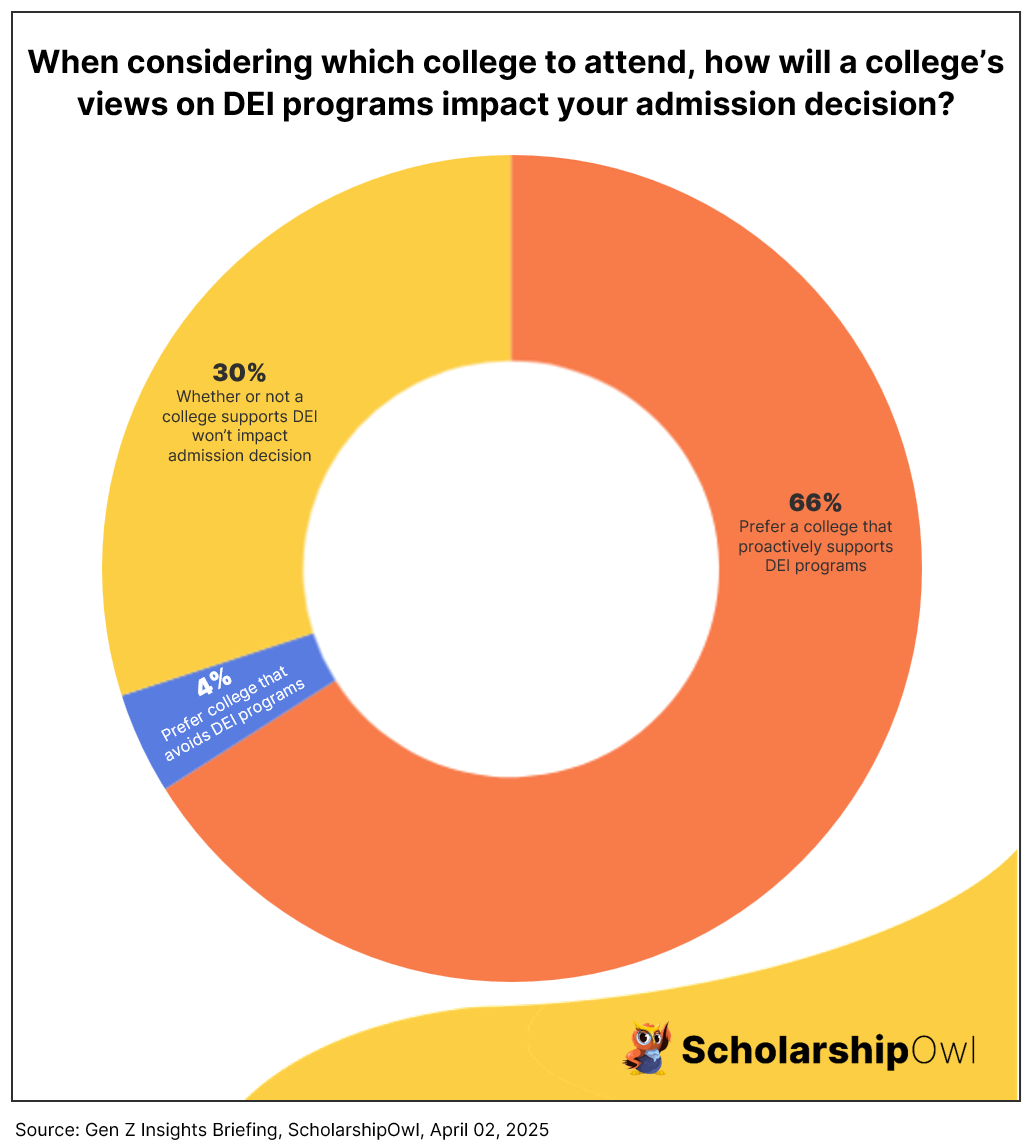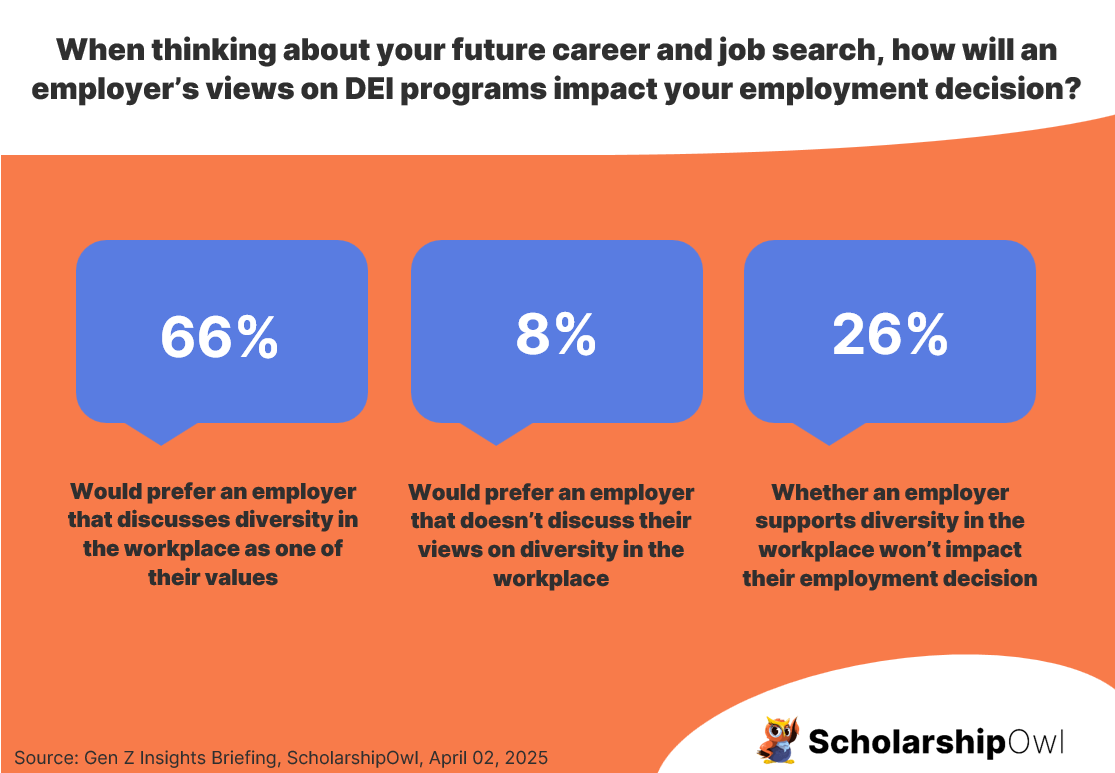A recent Forbes article reports there has been an 822% spike in Google searches for the phrase “companies with DEI” after the Trump Administration issued executive orders related to prohibiting diversity, equity, and inclusion (DEI) programs in federal agencies, as well as ending federal funding for public schools and colleges that have DEI programs and services.

According to NBC News and multiple other sources, Gen Z is the most racially diverse and fastest growing segment of the electorate, and Gen Z is also the most diverse generation in U.S. history. DEI programs have grown in popularity on college campuses because these programs help foster a sense of belonging, which leads to greater academic achievement.
Against this backdrop, ScholarshipOwl conducted a survey in March 2025 to develop greater insight into how Gen Z students feel about diversity, equity, and inclusion (DEI) programs in higher education as well as in the workplace. The overwhelming majority of respondents (81%) feel that DEI programs have a positive impact on students; however, just over one-third (30%) indicated that whether or not a college supports DEI wouldn’t impact their admission decision.
Win more scholarships with less effort
Simplify and focus your application process with the one-stop platform for vetted scholarships.
Check for scholarshipsWho participated in the survey?
In March 2025, ScholarshipOwl surveyed 11,435 high school and college students on the ScholarshipOwl scholarship platform to learn more about their perspectives on DEI programs in college and in the workplace.
Among the respondents, 58% were female, 40% were male, and 2% identified themselves as a different gender identity or preferred not to respond to the question. Just over half (51%) were Caucasian, 19% were Black, 17% were Hispanic/Latino, 6% were Asian/Pacific Islander, 1% were American Indian/Native American and 5% selected “other” or preferred not to respond to the question.
Nearly two-thirds (64%) of the respondents were high school students, with the overwhelming majority high school seniors; over one-quarter (28%) were college undergraduate students, primarily college freshmen and college sophomores; 7% were graduate students and 3% identified themselves as adult/non-traditional students.
Question 1
The first question in the survey asked students, “Do you feel DEI programs have a positive or negative impact on students?”

- 81% said positive impact
- 19% said negative impact
Question 2
Next, students were asked to reflect on how a college’s perspective on DEI programs might affect their college choice.

- 66% said they would prefer a college that proactively supports DEI programs and services
- 4% said they would prefer a college that avoids / removes DEI programs and services
- 30% said that whether or not a college supports DEI won’t impact their college admission decision
Question 3:
The final question in the survey asked students to consider how an employer’s perspective on DEI programs might affect their job search and future employment.

- 66% said they would prefer to work for a company or organization that discusses diversity in the workplace as one of their values
- 8% said they would prefer to work for a company or organization that does not discuss their views on diversity in the workplace
- 26% said that whether or not a company or organization supports diversity in the workplace won’t impact their decision in working for them
The importance of belonging
Colleges are focused on ensuring that students feel a sense of belonging during the challenging transition between childhood and adulthood. When a student feels that they belong, they are more likely to develop resilience, and are better able to successfully transition to college life. Students who feel they belong are more likely to show up for classes, and are more likely to excel academically. They are more likely to return the next term, and are more likely to graduate. Due to extensive university research conducted regarding the importance of belonging, colleges responded by developing DEI programs and services that helped create inclusive social opportunities and learning environments that were designed to support underrepresented and underserved students.
But colleges don’t necessarily have to offer DEI-designated organizations and activities to foster a sense of belonging; there may be other avenues that colleges can explore to ensure that all students feel welcomed and supported. If you are weighing college admission offers, you may want to better understand how well you might feel that you “belong” at each campus you are considering. Some colleges have clearly stated their support for diversity, equity and inclusion initiatives despite the potential loss of federal funding; other colleges have reduced or eliminated programs that support these initiatives. You may want to reach out to each college’s admissions office or to your major department to ask how the college is responding to the Trump Administration’s executive orders regarding DEI, or you may want to ask about programs and services that help ease the transition to college to ensure that students feel that they belong. Gathering this information can help you to better understand what to expect, and can help you to make your admission decision.
What can a student do to boost their sense of belonging on campus?

- Participate in meet-and-greet opportunities in your dorm, and try to interact with just one person who you think you might get along well with.
- Think about the hobbies and interests you participated in when you were in high school. Seek out clubs and activities on your college campus that enable you to meet other students with similar interests.
- Talk with your dorm’s resident advisor (RA) and let them know you are struggling a bit. Ask for their help and advice.
- Get to know the staff that work in your major department. Let them know that you would like to be more involved in activities related to your academic pursuits, and ask them to let you know about available opportunities.
- Consider joining a sorority or fraternity – you’ll find your calendar quickly fills up with activities, and that you’ve got “sisters” or “brothers” who can lift you up when you’re feeling down.
- Visit your favorite professor(s) during office hours and chat them up. Ask about opportunities to support them as a teacher’s assistant (TA) or to help out as an undergraduate research assistant.
- Find out about sports and recreation activities available on your campus, whether or not you are an athlete. Colleges have plenty of opportunities for non-athletes to participate.
- If you’re feeling down because your classes are stressful or the homework is super challenging, schedule an appointment with your college tutoring center. Getting some extra help from another student will help you feel more confident, and soon your grades will show that renewed confidence.
- Schedule an appointment with a mental health counselor at your campus health center.
- Ask a friend or family member to schedule a day to visit you – you’ll have something to look forward to, and it will also give you an opportunity to plan an itinerary of activities to do with your guest.
- Spend time outside – sometimes just getting some fresh air can make you feel more relaxed and confident.
Looking for more college advice?
ScholarshipOwl is your go-to resource for everything you need to know about applying to college, college life, and paying for college with scholarships and other debt-free sources. To find out more, visit www.scholarshipowl.com.



